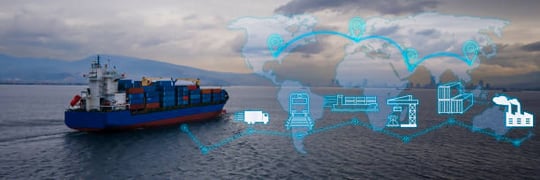
Planning Through the Storm: Tackling Disruptions in Industrial Manufacturing
In today’s volatile manufacturing landscape, production planners in industrial facilities are increasingly finding themselves on the front lines of disruption. From geopolitical tensions and trade restrictions to natural disasters and raw material shortages, supply chain shocks are becoming not only more frequent but also more severe. For industrial manufacturers that rely on complex multi-tier supply chains, the ability to respond swiftly and strategically to these disruptions can be the difference between profitability and production paralysis.
Advanced Planning and Scheduling (APS) systems like PlanetTogether, when integrated with leading ERP solutions such as SAP, Oracle, Microsoft Dynamics, Kinaxis, or Aveva, are equipping production planners with the tools to pivot quickly, maintain operational agility, and optimize production even in the face of unforeseen challenges.
This blog explores how production planners in industrial manufacturing can leverage APS and ERP integration to solve supply chain disruptions, minimize downtime, and future-proof their operations.
The New Normal: Persistent Supply Chain Volatility
Supply chain disruptions are no longer isolated incidents—they are systemic challenges. A McKinsey study found that companies can now expect supply chain disruptions lasting a month or longer to occur every 3.7 years on average. These disruptions stem from various causes:
Global conflicts and tariffs that interrupt material flows.
Unpredictable demand swings that outpace production capacity.
Labor shortages and pandemic aftershocks.
Cybersecurity risks targeting manufacturing systems.
Climate events impacting transport and energy availability.
For production planners, the question is no longer if a disruption will occur but when—and how to prepare for it effectively.

The Role of the Production Planner in Disruption Management
Production planners in industrial manufacturing must go beyond scheduling tasks; they need to become strategic orchestrators of supply chain resilience. This involves:
Creating realistic production schedules that adjust for supplier delays or shortages.
Rebalancing plant capacity when key inputs are late or unavailable.
Ensuring resource availability (labor, equipment, and raw materials) aligns with changing production priorities.
Working closely with procurement, logistics, and operations to mitigate risks across the value chain.
Traditional planning tools and spreadsheets are no match for these complex demands. Instead, planners must turn to integrated digital solutions to achieve real-time visibility, flexibility, and control.

Enter PlanetTogether APS: Turning Disruption into Opportunity
PlanetTogether Advanced Planning and Scheduling software is designed specifically to empower planners in high-mix, high-variability manufacturing environments. When integrated with leading ERP systems such as SAP, Oracle, Microsoft Dynamics, Kinaxis, or Aveva, PlanetTogether unlocks several key capabilities that help tackle disruptions head-on:
Real-Time Scenario Planning
With PlanetTogether’s scenario simulation features, production planners can run “what-if” analyses to understand how different disruption scenarios—such as a late delivery or a machine failure—will affect production timelines. Planners can model multiple contingencies and instantly assess the impact on KPIs such as lead time, throughput, and resource utilization.
Integrated Advantage: ERP systems like SAP and Oracle provide the transactional data (e.g., inventory levels, purchase orders, BOMs), which PlanetTogether uses to generate precise production simulations that are grounded in real-time realities.
Dynamic Rescheduling and Constraint Management
When a disruption occurs, the system automatically reschedules jobs to minimize bottlenecks and downtime while honoring constraints such as machine availability, operator shifts, and raw material lead times. The APS engine recalibrates plans within minutes—something manual planning simply cannot achieve.
Integrated Advantage: With live data from Microsoft Dynamics or Aveva MES feeding into PlanetTogether, production plans reflect up-to-the-minute shop floor realities. This prevents infeasible plans and ensures responsiveness.
Multi-Plant Coordination
For industrial manufacturers with distributed production sites, a localized disruption—such as a labor strike or regional shipping delay—can ripple across the entire supply network. PlanetTogether enables cross-facility scheduling and coordination, allowing planners to shift production from one plant to another when necessary.
Integrated Advantage: ERP platforms like Kinaxis and Oracle support supply chain orchestration across networks. When combined with PlanetTogether’s multi-plant scheduling, planners gain the ability to redirect workflows with minimal friction.
Inventory Optimization
Disruptions often lead to excessive safety stocks or critical shortages. PlanetTogether helps production planners find the optimal balance between service levels and inventory costs. Through integration with ERP systems, it considers existing stock levels, supplier reliability, and production forecasts to avoid overstocking or stockouts.
Integrated Advantage: SAP’s inventory management and demand forecasting data feed directly into APS models, aligning inventory strategy with real-time production needs.
Key Takeaways for Industrial Production Planners
Visibility is non-negotiable. APS + ERP integration enables a unified view of supply, demand, and capacity, giving planners the clarity to act quickly.
Speed beats perfection. Automated rescheduling and scenario planning allow planners to make rapid, data-driven decisions in uncertain environments.
Collaboration is streamlined. By centralizing data and workflows, production, procurement, and logistics teams align more effectively around disruption response.
Technology enables resilience. Leveraging the joint power of PlanetTogether and ERP systems like SAP, Oracle, Microsoft, Kinaxis, or Aveva can transform reactive planning into proactive strategy.
In an era defined by disruption, production planners in industrial manufacturing must evolve from schedulers into strategic orchestrators. The integration of PlanetTogether APS with leading ERP systems empowers planners with the tools, visibility, and flexibility to navigate supply chain uncertainty with confidence.
By unifying real-time data with intelligent scheduling capabilities, production planners can turn crises into opportunities for operational excellence—ensuring their facilities not only survive disruptions but emerge stronger from them.
Are you ready to take your manufacturing operations to the next level? Contact us today to learn more about how PlanetTogether can help you achieve your goals and drive success in your industry.